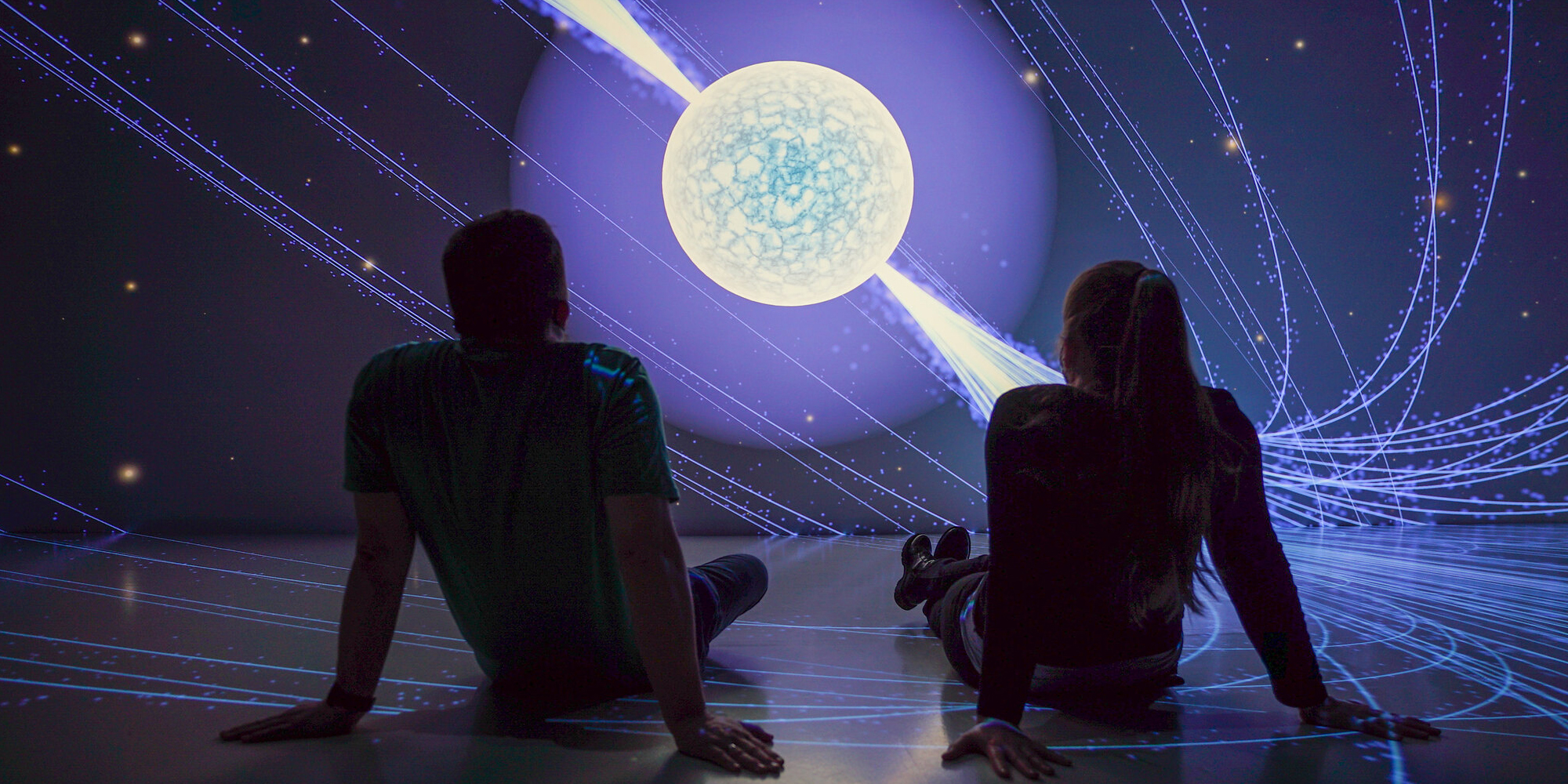press release as PDF
photo album astronomy in Deep Space 8K
Ars Electronica Blog
(Linz, 24.10.2022) Since 2016, the Ars Electronica Center has been a European Space Education Resource Office, or ESERO for short, which is operated in cooperation with the European Space Agency (ESA) and aims to introduce young people to scientific, technical topics through their fascination with the subject of space. On the ESERO weekend, Saturday October 29 and Sunday October 30, 2022, visitors to the Ars Electronica Center will discover pulsars and black holes on virtual journeys through the universe, tinker with solar-powered beetles, experiment with materials from space travel and use a microscope to observe tiny tardigrades that can even survive in space.
Children’s Research Lab: The World in Tons – the Universe
SAT 29.10.2022 & SUN 30.10.2022 / each 10:30 am – 11:30 am & 2:30 pm – 3:30 pm / From 6 to 10 years
Young researchers take note: In the Kids’ Research Lab, there are all kinds of interesting facts to learn about scientific findings and new technologies of the 21st century. By means of various tasks, important topics of the present are dealt with and connections are shown. This weekend, visitors will learn all kinds of curiosities about the universe.
Deep Space: Uniview: A grandiose journey through space and time
SAT 29.10. & SUN 30.10.2022 / each 11:30 am – 12:00 pm & 2:00 pm- 2:30 pm / For all ages
Deep Space 8K, with its 16-by-9-meter wall and floor projections, is the optimal location for virtual journeys through space. Using the Uniview visualization software, visitors will visit the James Webb Space Telescope, take in a neutron star with dizzying rotation, and examine a black hole with realistic gravitational lensing.
Bear Feeding
SAT 10/29 & SO 10/30/2022 / each 12:00 pm – 12:30 pm each day / From 6 to 14 years
Only a few visitors know that there are bears in the Ars Electronica Center. And there are quite a few of them. However, they don’t belong to the genus “Master Petz” but to the so-called water bears or tardigrades. And they are scientifically very interesting, because they can survive extreme heat and cold, radioactive and cosmic radiation and even stay in vacuum without any problems. However, these little animals naturally also want to be nurtured and cared for so that they can grow and thrive.
Deep Space: Earth – A very special planet
SAT 29.10. & SUN 30.10.2022 / each 1 pm – 1:30 pm / For all ages
Earth is an extraordinary place, as it is the only planet known to us so far on which life exists. But what conditions are necessary for life to develop and flourish on our “home base”? Here you can learn a lot of interesting facts about the special features of the Earth: from the powerful protective shield that protects us from cosmic radiation to the perfect location in the habitable zone of the Milky Way.
Open Workshop: One/None/Pure Rocket Science
SAT 29.10.2022 / 1:00 pm – 2:00 pm / From 8 to 14 years
In the Kids’ Research Lab, outer space becomes a research and play space with spaceships, rockets or satellites. But who has ever taken a closer look at such space vehicles? What are they made of and what requirements must the materials used actually meet? While experimenting, the children become material researchers and discover the building materials of space travel.
Workshop: Solar Bugs
SUN 30.10.2022 / 1:00 pm – 2:00 pm / From 8 to 12 years
Sustainable energy supply meets handicraft fun and robotics. In the Solar Bugs workshop, participants make small robot beetles that are powered by solar energy just like lunar or Mars rovers.
About ESERO
ESERO stands for “European Space Education Resource Office” and is operated in cooperation between the European Space Agency (ESA) and national partners in the individual ESA member states. In Austria, the tenth ESERO across Europe began operations in June 2016 at the Ars Electronica Center. The project is funded by ESA and BMK/FFG. In addition to Austria, 20 European nations have an ESA education office.
The goal of ESERO is to use the fascination of the topic of space to introduce young people to scientific and technical topics. The main target group is teachers at primary and secondary level. In the long term, the project aims to increase the number of children and young people who decide to pursue a career in science and technology. To achieve this goal, ESERO offers teachers a wide range of teaching materials and training programs.
Photo:
Uniview 3.0 – Pulsar / photo: Ars Electronica – Robert Bauernhansl / print version
Photo:
Earth from Space / photo: Ars Electronica – Robert Bauernhansl / print version
